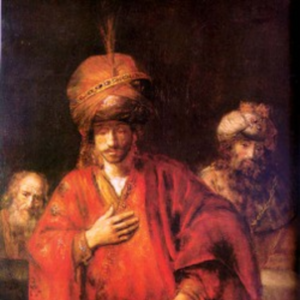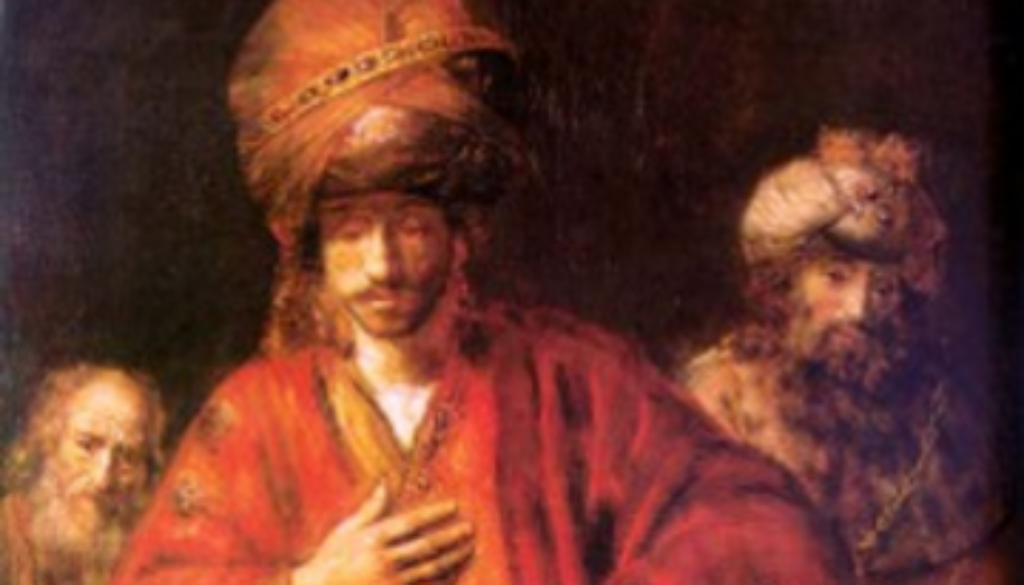Ester 3:1-15 Haman

Haman walks into our story. He is a proud and arrogant man. His entrance spells trouble for Mordecai and all the Jews in Persia.
Haman must have been something special to King Ahasuerus. He placed Haman’s position just under his own. This elevated status reminds me of Joseph’s status just under Pharaoh in Egypt. Everyone was to obey and honor him as they were to do with Haman. He was the king’s second in command.
Haman was NOT the one who noticed Mordecai’s behavior, the other servants of the king did. Every day they tried to get Mordecai to do as they had to do. They had to bow down to Haman so why should Mordecai be excused. I wonder if they were jealous. Did they not want to be made to bow down? Or were they seeking to actually honor Haman by reporting Mordecai?
Day after day the others who were in Haman’s presence bowed to him when he passed. Whether they respected him or honored the king’s command, they performed to act demanded of them without fail. But Mordecai bowed to no man. He bowed only to his God. As a Jew this was how he interpreted his command from the Lord. “Thou shalt have no other gods before me.”
But is this really what God meant by those words? No bowing down or showing respect to leaders. If Haman was meaning to put himself above God, then, yes Mordecai did right. But if the action of bowing down was no more than a ‘salute’ to one in authority, is it possible that Mordecai might have taken this a bit too far? In the New Testament we are told in several places to obey the laws of the land and to respect those set in authority over us. We are told in both testaments that God is the one who sets the authority over us.
Did Mordecai somehow discern that Haman wanted more than simple recognition? Did Haman want abject worship instead? This would definitely have been against what God told His people to do. And Mordecai had every right to refuse to bow down in worship to Haman, just as the three Hebrew children did in the story of Daniel. The king was commanding worship of the idol he raised up. This was NOT an act that God looked on as appropriate. Interesting is the fact that only three stood up against this command when I’m certain there were many more Hebrews in attendance that day.
So was there some history between the Jews and the Agagates that prompted Mordecai’s actions? I tried googling this but didn’t find an answer. Google puts Haman down as an Ammonite, descendant of the king Agog. Relations between these two people were not good, in fact they were enemies. Maybe this is what fueled Mordecai’s refusal and Haman’s hatred.
Haman’s hatred is WAY out of proportion to Mordecai’s response. Maybe it was because of the reason Mordecai gave for his refusal to bow. Mordecai openly told the king’s servants that he would not bow because he was a Jew, therefore, implying that no Jew would bow to Haman. Did Haman test this assumption or take it as fact?
Casting lots for the day to enact vengeance on the Jews confuses me. How did they do this? It looks to me like there was a giant game of dice going on. Each day on the calendar would be proposed and if the dice (lot) came up favorable for that day, then it was chosen. They went through almost the entire year before one day finally met with their requirements of favorable outcome. I wonder what would have happened if none of the days came up as acceptable. Would a random date have been chosen instead? But this much later date gave the Jews time to prepare. They had months to get ready and to turn to God for help.
Haman used the same trick many others before him had employed to get his way; he told half-truths. Haman was second only to the king and he used his position to carry out his own agenda. He first convinced the king that there was an entire people in the kingdom that were being a problem. In fact they were so much of a problem that they needed to be eradicated. But not immediately; on a future date that he had already decided on. And like any trusting friend, the king asked no more questions and trusted his closest advisor.
The whole city of Susa was up in arms over this new proclamation. This tells me there were a lot of Jews in the city. This decree affected them more than any other people. There may have also been many who supported this decree because of some animosity against the Jews. We have seen that happen over the centuries where one group of people are hated above all others because of misinformation. Adolf Hitler and his ability to sway people to his viewpoint is a prime example of that. So we leave our story as the people hear about the day Haman has been permitted to enact genocide.
Makes one wonder what half-truths have been spun in our world and what damage they have caused. I have already mentioned one such historical instance; Adolph Hitler’s twisting of truths. How many more have shaped our world and world view? How many more are still to come?
One thing to note though is that God is still in control, even in the face of half-truths. God knows the beginning and the end. He is not caught off guard by the actions of man. And He will care for His children no matter what! He doesn’t promise an easy path but He does promise to be with us while we walk the roads laid out before us.
Father God, thank You for never turning loose of my hand. Thank You that, even when the roads get rough, You are STILL in control. I know that even if something in my life brings about my death, that is NOT the end. My final destination is in Your arms! I put my life in YOUR hands and trust You to work out the details.



